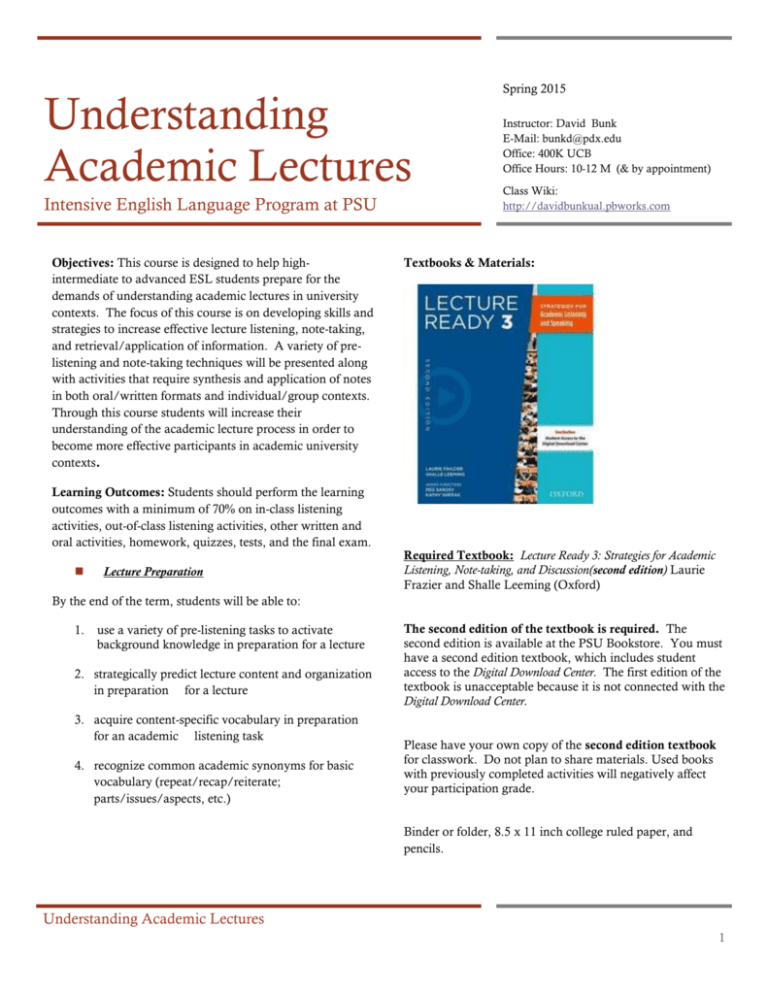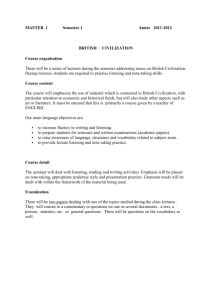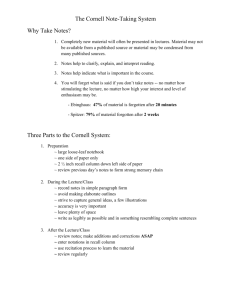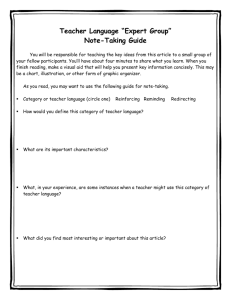- davidbunkual
advertisement

Understanding Academic Lectures Intensive English Language Program at PSU Objectives: This course is designed to help highintermediate to advanced ESL students prepare for the demands of understanding academic lectures in university contexts. The focus of this course is on developing skills and strategies to increase effective lecture listening, note-taking, and retrieval/application of information. A variety of prelistening and note-taking techniques will be presented along with activities that require synthesis and application of notes in both oral/written formats and individual/group contexts. Through this course students will increase their understanding of the academic lecture process in order to become more effective participants in academic university contexts. Learning Outcomes: Students should perform the learning outcomes with a minimum of 70% on in-class listening activities, out-of-class listening activities, other written and oral activities, homework, quizzes, tests, and the final exam. Lecture Preparation Spring 2015 Instructor: David Bunk E-Mail: bunkd@pdx.edu Office: 400K UCB Office Hours: 10-12 M (& by appointment) Class Wiki: http://davidbunkual.pbworks.com Textbooks & Materials: Required Textbook: Lecture Ready 3: Strategies for Academic Listening, Note-taking, and Discussion(second edition) Laurie Frazier and Shalle Leeming (Oxford) By the end of the term, students will be able to: 1. use a variety of pre-listening tasks to activate background knowledge in preparation for a lecture 2. strategically predict lecture content and organization in preparation for a lecture 3. acquire content-specific vocabulary in preparation for an academic listening task 4. recognize common academic synonyms for basic vocabulary (repeat/recap/reiterate; parts/issues/aspects, etc.) The second edition of the textbook is required. The second edition is available at the PSU Bookstore. You must have a second edition textbook, which includes student access to the Digital Download Center. The first edition of the textbook is unacceptable because it is not connected with the Digital Download Center. Please have your own copy of the second edition textbook for classwork. Do not plan to share materials. Used books with previously completed activities will negatively affect your participation grade. Binder or folder, 8.5 x 11 inch college ruled paper, and pencils. Understanding Academic Lectures 1 Note-Taking: 5. recognize verbal and non-verbal lecture cues and conventions to increase effective lecture listening and note-taking 6. write and organize notes using/integrating a variety of note-taking techniques, such as: Course Calendar: Week 2 3 Post Lecture Retrieval/Application: 10. develop strategies for filling in missing information (requesting clarification from peers and instructor, etc.) 13. summarize and synthesize listening information in both oral/written formats and individual/group contexts 14. test the accuracy of notes by using them to answer questions representative of those on university tests using complete and accurate information and grammatical forms (essay questions, short-answer, multiple-choice, and true/false) 4 note-taking practice tasks PSU Class Observation Assignment outline format visualorganization/outlining note taking practice: review outline symbols/abbreviations lecture 1 in-class preparation comparing notes/highlighting lecture comprehension 5 6 7 comparing notes/highlighting Ch. 1 quiz lecture 2 preparation Strategy Focus: Lecture language Ch. 3 quiz lecture comprehension lecture 3 Note taking/activities Proficiency Test #1 review proficiency Ch. 4 prep Ch. 4 group activity Ch. 4 quiz comparing notes/highlighting Ch. 5 prep Course Components: lecture comprehension 10% PSU Classroom Observation Assignment (See classroom handout for directions) 10% Note-Taking Activities (Including the note-taking rubric to assess notes.) 25% diagnostic review /numbers/organization 11. participate in oral discussions of academic listening using complete and accurate information and grammatical forms 12. apply content specific vocabulary to retrieval/application tasks outlining review symbols and abbreviations 9. revise and/or rewrite notes so that they are better organized and include all relevant information syllabus overview note taking: 8. identify gaps in information Thursday Diagnostic 1 7. use symbols and abbreviations to increase note-taking speed and accuracy 10. take notes in English with minimal first language usage Tuesday Chapter Quizzes (These are shorter quizzes on lecture language, chapter comprehension, chapter vocabulary, short 8 Ch. 5 quiz Ch. 6 prep comparing notes/highlighting lecture comprehension Understanding Academic Lectures 2 video assessment lectures on chapter related topics, etc.) 25% 30% Listening and Note-Taking Skill Proficiency Tests (These are longer lectures and note-taking with brand new information. Learners listen one time and take notes in class; Teacher collects all notes. Then learners use the notes in the next class to take the test. Note-taking rubric is used to assess notes.) Comprehensive Final Exam (The final exam covers some previous material, such as lecture language, vocabulary, discrete listening and note-taking strategies, but is mostly based on showing skill achievement by way of a new listening note-taking, and retrieval/application tasks.) Standards for Advancement: Scores below 70% in any of the five grading categories above may result in failure of this course. If you are taking any level 3 course, you must pass that course in order to move up to the next level Communication course. 9 Proficiency Test #2 Ch. 7 prep Lecture 7 Note Taking/Activities Strategy Focus Reviewing and practicing all note-taking strategies 10 Prep for Final Exam Lecture 11 Final Exam Final Exam Lecture(given on the last day of class) Holidays (school closed) May 25th, Memorial Day (school closed) *We will not necessarily follow this order in the textbook. I will change the weekly objectives as the need arises. Lecture Listening Outside of Class: A majority of the lecture listening for this course will be completed outside of class at the Digital Download Center for our textbook. You must have a second edition text, and you must use the access code on the inside of the back cover of your textbook. It is your responsibility to listen to the lecture content outside of class. If you don’t prepare, you will be unable to participate in the classroom support activities and assessments. IELP Attendance Policy: Attendance is required in all IELP classes. Attendance is required for academic reasons and to maintain your immigration status. If you don't attend class, you will not learn, you will miss important quizzes and tests, and you will not earn good grades. If you don't attend class, you will violate the terms of your student visa. If you don't attend class, you can be dismissed from the IELP. In addition, you must come to class on time. Late = 10min or later after the class begins, and 3 late arrivals = 1 absence. o If you are more than 10 minutes late, you will be marked absent. I will only take attendance once. If you arrive after attendance is taken, it is your responsibility to notify me during break or before leaving the classroom in order to remove your name from the absentee list. If you do not notify immediately, I will be unable to change your attendance record. o There are no excused absences. o If you are absent, you are responsible for the information covered in class. You must contact the teacher or a reliable classmate for homework and important information prior to returning to class. Understanding Academic Lectures 3 o No make-up tests or class work will be accepted. o Late homework is not accepted. o Since much of your final grade is based on class work, it is essential that you attend every day. If you are absent on a day that a class work grade is given, you will receive a zero Academic Honesty: Academic dishonesty in the IELP includes but is not limited to the following type-o Cheating on tests and other written work used for grading and student assessment as determined by the instructor. If a student has cheated or plagiarized material that is graded, the student will receive a zero or failing grade for that work. In the case of major assessment work (finals, research papers) this may result in failure of the class. Academic dishonesty may also result in a formal Academic Dishonesty Incident Report that will be attached to the student’s official grade record. Classroom Conduct: It is expected that you demonstrate the highest level of respect for your peers and your instructor. You are also expected to fully participate in multi-cultural group activities. You are expected to participate equally and respectfully with all members of the group regardless of cultural background. All points of view will be welcomed and respected. Statements or behaviors that are disrespectful towards individuals or groups will not be tolerated. Distracting behaviors are also unacceptable. Examples of distracting behaviors are: coming in late, packing up or leaving early, using cell phones, having side conversations, interrupting the instructor or another classmate while they are speaking, etc. Please refrain from these behaviors. Accommodation Statement: If you have difficulty hearing, seeing, walking, or have any other condition that will make studying in this class difficult, please tell me, and I will help you if I can. Listening Resources in the Learning Center 1. 2. 1. 2. 3. 4. 5. 6. 7. 8. IBT TOEFL software Short Takes Level 3 (Ask the attendant for the DVDs) On-line Listening Websites www.frontline.org This website offers hour-length documentaries about a variety of current topics in the U.S, and around the world. www.ted.com This website has 10-15 minute speeches on a variety of topics given by influential and inspirational people all over the world. If you choose to listen to a talk from this website that is only 10 minutes long, I will accept it as one of your entries for the biweekly assignment. www.academicearth.com This website has full-length lectures from university courses on a variety of topics. This is a great way to see areal university class in action! www.60minutes.com This is one of the most known Sunday Evening News programs in the U.S. There are news reports about issues in the U.S. and the world. Each segment is usually about 10-15 minutes. http://www.cosmolearning.com/ This website has full-length lectures from university courses on a variety of topics. This is a great way to see a real university class in action! http://www.uctv.tv/ondemand/ This website has lectures, videos and podcasts from the University of California on a variety of topics. http://www.youtube.com/education?lg=EN&b=400&s=mp&t=m This is YouTube’s educational video and lecture website. http://forum-network.org/station/wgbh This website features lectures and talks that were aired on Public Television. Understanding Academic Lectures 4 9. http://www.freesciencelectures.com/ This website has free science videos and lectures online. 10. http://royalsociety.org/ This website is great if you want to practice listening to lectures with speakers who have a British accent. 11. Literacy Net http://literacynet.org/cnnsf/archives.html This site has current and older news stories that can help you practice English. Often the story has an audio file, the written transcript and an outline of the story. Although the outlines do not use symbols and abbreviations, you can check your notes against the outline to see if you are organizing your information correctly. 12. Lectures: http://www.english-test.net/toefl/listening/lectures.html 13. Discussions: http://www.english-test.net/toefl/listening/ This site has 50 lectures and 50 discussions to help you prepare for the TOEFL. It also has comprehension questions and transcripts to help you. 14. http://nigelteacher.wordpress.com/links/listening/ Nigel “Teacher” Caplan’s website with links to many different listening websites. 15. www.elllo.org This website has many different activities for all levels. 16. http://www.manythings.org/ This has a variety of ESL activities for all skills. Understanding Academic Lectures 5



